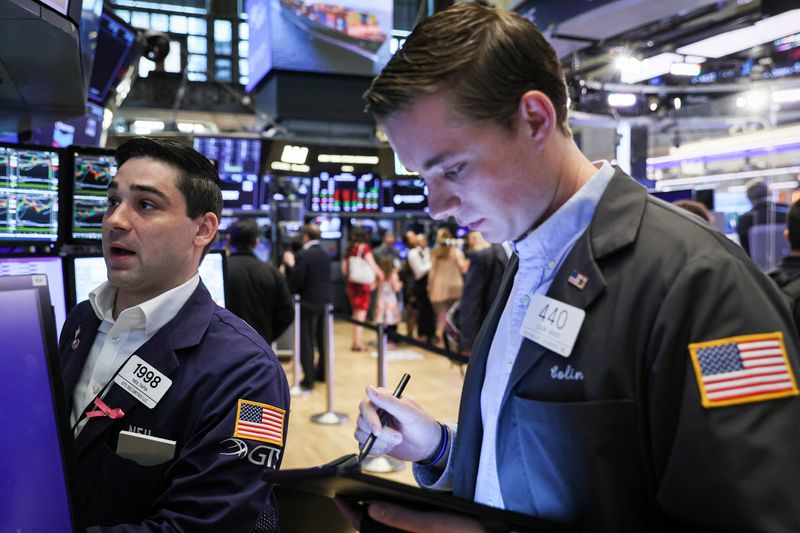By Chris Prentice and Nell Mackenzie
NEW YORK/LONDON (Reuters) -Wall Street shares were mixed and European stocks finished little-changed as talks in Washington resumed to avert a U.S. default, while gold prices retreated under pressure from hawkish remarks by Federal Reserve officials.
Oil prices finished higher on demand optimism. U.S. treasury yields rose.
House Republican Speaker Kevin McCarthy said Monday morning's debt talks were "on the right path" ahead of a meeting with U.S. President Joe Biden. June 1 remains a "hard deadline" after which Treasury expects the federal government will struggle to pay its debts, a stance the agency reiterated on Monday.
A failure to lift the debt ceiling would trigger a default, likely sparking chaos in financial markets and a spike in interest rates.
The MSCI world equity index, which tracks shares in 49 nations, gained 0.19%.
The S&P 500 edged up 0.02% to end the session at 4,192.63 points and the Nasdaq gained 0.50% to 12,720.78 points, buoyed by technology sector gains. The Dow Jones Industrial Average declined 0.42% to 33,286.58 points.
Europe's STOXX 600 index was little-changed, recovering earlier losses.
"There is broad expectation that a deal will get done in Washington. The market is responding to that," said Quincy Krosby, chief global strategy at LPL Financial in Charlotte, North Carolina.
"There has been some hedge-fund buying in the regional banks. That is a healthy sign for the market."
The KBW Banking index jumped about 3%.
Jonathan Pingle, U.S. chief economist at UBS, said the Japanese yen and gold were best placed to benefit from any U.S. default.
"Only a one-month-long impasse post the X-date is likely to cause a tightening of financing conditions sharp enough that it causes the dollar to rally strongly," said Pingle.
CHIP BAN
In a move seen as a ramping up of U.S.-China trade tensions, Beijing on Sunday barred U.S. firm Micron (NASDAQ:MU) from selling memory chips to key domestic industries over security concerns.
The ban helped stocks of Micron's rivals in China and elsewhere, which are likely to benefit as mainland companies seek memory products from other sources.
Minneapolis Federal Reserve President Neel Kashkari said it was a "close call" whether he would vote to raise interest rates or to pause the central bank's tightening cycle when it meets next month. San Francisco Fed President Mary Daly said it is too soon to say what the central bank will do next.
Inflation has eroded U.S. households' sense of financial security, the Fed said.
"No one should think the Fed is afraid of raising rates again. They have the luxury of a solid labor market, a consumer still willing to spend, and an economy that is growing, albeit slowly," LPL's Krosby said.
Spot gold prices fell 0.25% to $1,971.68 an ounce by 4:47 p.m. EDT (2047 GMT). Gold futures settled down 0.22% at $1,977.20.
The yield on benchmark 10-year Treasury notes rose to 3.7206% from 3.692% previously. The two-year yield, which rises with traders' expectations of higher Fed fund rates, touched 4.3346% compared with a prior close of 4.289%.
The dollar index, which tracks the greenback against a basket of currencies of other major trading partners, was up at 103.25.
In Asia, China kept its key lending rates unchanged even as an economic recovery disappointed. Traders were also digesting the implications of the Group of Seven's "de-risk, not decouple" approach to China and supply chains that the group flagged at its summit.

MSCI's broadest index of Asia-Pacific shares outside Japan rose 0.6%.
U.S. crude finished up 0.61% at $71.99 a barrel. Brent crude rose 0.54% to settle at $75.99 per barrel.[O/R]
